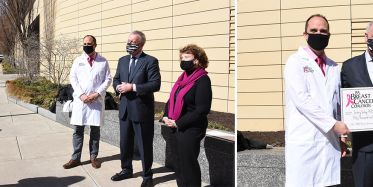Zachary Schug, Ph.D.
-
Assistant Professor, Molecular and Cellular Oncogenesis Program, Ellen and Ronald Caplan Cancer Center
Schug is interested in investigating metabolic adaptation in cancer cells through cell biology, biochemistry, liquid chromatography-mass spectrometry (LC-MS)-based lipidomics, and metabolomics.
After completing his B.S. in biology from Saint Joseph’s University, Schug continued his studies in Philadelphia and earned a Ph.D. in molecular cell biology from Thomas Jefferson University. In 2008, he began his postdoctoral studies at the Beatson Institute in Glasgow, U.K. Schug joined The Wistar Institute in 2016 as an assistant professor. He also holds adjunct faculty positions in the Department of Systems Pharmacology and Translational Therapeutics at the University of Pennsylvania and the Department of Biochemistry and Molecular Biology at Drexel University.
The Schug Laboratory

The Schug Laboratory
Alterations in the acquisition and metabolism of nutrients are now firmly recognized as hallmarks of cancer development. Many, if not all, oncogenes and tumor suppressor genes induce metabolic reprogramming in cancer cells through changes in the regulation of enzymes and transporters. These changes are necessary for cancer cells to meet the combined biomass and energy demands for growth and are only satisfied by increased capture and synthesis of cellular building blocks such as sugars, fats, and proteins. In addition, cancer cells often invade other tissues where the availability of certain nutrients is drastically different or grow so quickly that the blood supply, and the accessibility to oxygen and other nutrients that comes with it, becomes scarce. During these conditions of nutrient stress, many cancer cells will adapt and use alternative available resources to survive. As part of this process, we also study the interactions between cancer cells and tumor infiltrating immune cells. The lab seeks to better understand the competition for nutrients in the tumor microenvironment through the study of diet, immunometabolism, and tumor metabolism using LC-MS based approaches.
The Schug laboratory is interested in identifying and therapeutically targeting the metabolic changes that arise during the development of cancer and metastasis. They combine cell biology, biochemistry, metabolomics, lipidomics, and genomics to uncover novel metabolic vulnerabilities in cancer. These targets are then further developed for use as effective therapeutic strategies to improve cancer patient treatment.
-
Postdoctoral Fellow
Dzmitry Mukha, Ph.D.
-
Research Assistant
Katherine Pniewski
-
Graduate Students
Fabrizio Bertolazzi
Sabina Hlavaty
Kelsey Salcido -
Undergraduate Student
Dominic Duah
-
Postdoctoral Fellows
Katelyn Miller, Ph.D., former postdoc and American Cancer Society fellow (2017-2021); Research Scientist, Janssen Pharmaceuticals
Michael Hulse, Ph.D., former postdoc (2019-2020); Research Scientist, Prelude Therapeutics
Jessica Casciano, Ph.D., former postdoc (2016-2018); Licensing officer at Penn Center for Innovation.
-
Masters Student
Joshua Shaffer, M.S., former Masters student University of Pennsylvania CAMB graduate group, Cancer Biology (2019-2021); Ion Impant/Diffusion Process Engineer at Northrop Grumman.
-
Motivated candidates are encouraged to inquire about the positions below. Contact zschug@wistar.org.
- Postdoctoral Fellow
Schug Lab in the News
Selected Publications
Targeting Cancer Metabolism in the Era of Precision Oncology.
Stine, Z.E., Schug, Z.T., Salvino, J.M., Dang, C.V. “Targeting Cancer Metabolism in the Era of Precision Oncology.” Nat Rev Drug Discov. 2022 Feb;21(2):141-162. doi: 10.1038/s41573-021-00339-6.
Targeting ACSS2 with a Transition-State Mimetic Inhibits Triple-Negative Breast Cancer Growth.
Miller, K.D., Pniewski, K. , Perry, C.E., Papp, S.B., Shaffer, J.D., Velasco-Silva, J.N., Casciano, J.C., Aramburu, T.M., Srikanth, Y.V.V., Cassel, J., et al. “Targeting ACSS2 with a Transition-State Mimetic Inhibits Triple-Negative Breast Cancer Growth.” Cancer Res. 2021 Mar 1;81(5):1252-1264. doi: 10.1158/0008-5472.CAN-20-1847. Epub 2021 Jan 7.
MYC Regulates Fatty Acid Metabolism Through a Multigenic Program in Claudin-low Triple Negative Breast Cancer.
Casciano, J.C., Perry, C., Cohen-Nowak, A.J., Miller, K.D., Vande Voorde, J., Zhang, Q., Chalmers, S., Sandison, M.E., Liu, Q., Hedley, A., et al. “MYC regulates fatty acid metabolism through a multigenic program in claudin-low triple negative breast cancer.” Br J Cancer. 2020 Jan 16. doi: 10.1038/s41416-019-0711-3.
The Metabolic Fate of Acetate in Cancer.
Schug, Z.T., Voorde, J.V., Gottlieb, E. “The Metabolic Fate of Acetate in Cancer.” Nat Rev Cancer. 2016 Nov;16(11):708-717. doi: 10.1038/nrc.2016.87. Epub 2016 Aug 26.
Acetyl-CoA Synthetase 2 Promotes Acetate Utilization And Maintains Cancer Cell Growth Under Metabolic Stress.
Schug, Z.T., Peck, B., Jones, D.T., Zhang, Q., Grosskurth, S., Alam, I.S., Goodwin, L.M., Smethurst, E., Mason, S., Blyth, K., et al. “Acetyl-CoA Synthetase 2 Promotes Acetate Utilization And Maintains Cancer Cell Growth Under Metabolic Stress.” Cancer Cell. 2015 Jan 12;27(1):57-71. doi: 10.1016/j.ccell.2014.12.002.


